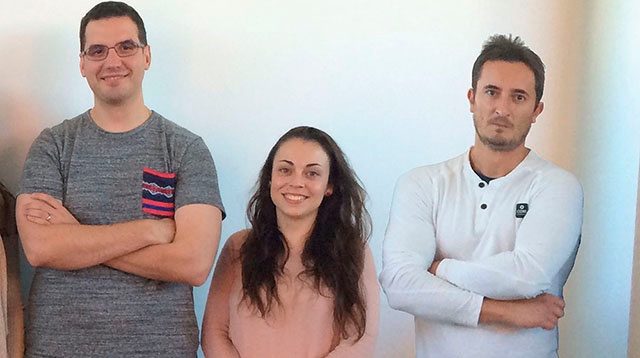Researchers of the Institute for Molecular Science (ICMol) and of the Institute for Chemical Technology (ITQ) have developed a new method that allows the development, at market price, of very effective catalysts for the synthesis of cycloheptatriens, high potential compounds for the chemical and pharmaceutical industry. The work, published yesterday in Mature Materials, provides opportunities for the development of more effective and cheaper catalysts, with special application in the field of fragrances.
The called metal clusters -set of linked atoms for nanotechnological purposes- present interesting characteristics in fields like catalysis. Nevertheless, the complexity of synthetizing and stabilising such little species obstructs its use on an industrial scale.
On the other hand, the cycloheptatriens and its derivatives are high potential compounds in Fine Chemicals and Pharmacy but are difficult to prepare. The metal clusters can act as catalysts by making its obtaining viable as the Valencian chemists Marta Mon, Jesús Ferrando and Emilio Pardo (ICMol, Universitat de València) in collaboration with the scientists of ITQ (CSIC-UPV) Avelino Corma and Antonio Leyva have shown.
‘To date, the only catalysts that can favour the reaction in an effective way were, mainly, rhodium compounds in solution, very expensive, toxic and non-reusable’, says Emilio Pardo, main researcher of the project.
The method described yesterday in the magazine Nature Materials allows to obtain a new catalyst based on the synthesis of palladium metal clusters inside of porous materials called MOFs (metal-organic frameworks). ‘The developed proceeding for the preparation of these catalysts is simple and the obtained catalysts is stable, so it can be reused with the same efficacy and it is much cheaper that the ones that the chemical industry uses nowadays’, says E. Pardo.
The resulting material is very active in the synthesis of cycloheptatriens. It will be interesting its application in the field of fragrances and also as precursor of polymers and other molecules of industrial interest.
Reference:
The MOF-driven synthesis of supported palladium clusters with catalytic activity for carbene-mediated chemistry
Francisco R. Fortea-Pérez, Marta Mon, Jesús Ferrando-Soria, Mercedes Boronat, Antonio Leyva-Pérez, Avelino Corma, Juan Manuel Herrera, Dmitrii Osadchii, Jorge Gascon, Donatella Armentano & Emilio Pardo
Link to the article:
https://www.nature.com/nmat/journal/vaop/ncurrent/full/nmat4910.html


